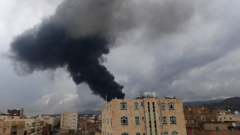Residents of Gaza are confronting extreme hunger as a recent UN report confirms famine conditions in parts of the territory. With limited access to food and healthcare, families are struggling to survive, describing devastating impacts on their health and the wellbeing of their children.
Gaza Faces Unprecedented Famine as Residents Suffer from Severe Hunger

Gaza Faces Unprecedented Famine as Residents Suffer from Severe Hunger
A UN report reveals famine conditions in Gaza, with residents sharing harrowing stories of starvation and desperate living situations amidst the ongoing conflict.
Residents of the Gaza Strip are grappling with severe hunger, as a UN-backed report has officially declared famine in some areas for the first time. The situation is dire, with many families reporting they have not consumed any protein in months, leading to alarming health consequences.
Reem Tawfiq Khader, a mother of five from Gaza City, lamented, "The declaration of famine came too late, but it is still important." She described how her youngest child, only four years old, has never tasted fruit or vegetables due to the ongoing food crisis. The UN has attributed the escalating famine to Israel's blockade on aid entering Gaza, a claim the Israeli government denies.
A recent statement from the Integrated Food Security Phase Classification (IPC) underscored the "entirely man-made" nature of the famine, indicating that over half a million people in the Strip are facing catastrophic conditions characterized by starvation and death.
Rajaa Talbeh, a mother of six, has felt the impact of the crisis personally, losing 25 kg (55 lbs) in weight after fleeing her home in Gaza City. Living in a makeshift tent, she struggles to find gluten-free food necessary for her intolerance, stating, "It’s not enough to face daily bombardment and displacement; now we face famine."
Other mothers, like Rida Hijeh, report heartbreaking transformations in their children. Her daughter, Lamia, has lost nearly half of her weight due to malnutrition, showing signs of severe health issues. Rida lamented the lack of available medical care, stating, "There is simply nothing for the child to eat. No vegetables, no fruits."
Healthcare workers, including British nurse Mandy Blackman from charity UK-Med, noted distressing rates of malnutrition among mothers, with 70% of those attending clinics suffering from clinical malnutrition. In stark contrast, the Hamas-run health ministry in Gaza reports that at least 271 individuals, including 112 children, have perished from famine-related causes since the military onslaught began.
Another resident, Aseel, shared her struggle, stating that she has lost significant weight and has been forced to spend all her savings on basic food items. With a sister-in-law desperately searching for baby formula, Aseel described the intense pressure of living day-to-day without a food stockpile, affirming, "Like thousands of people, we live day by day."
As the humanitarian crisis deepens in Gaza, the stark reality of famine continues to unfold amid ongoing conflict, leaving many to wonder about the future of their families and their community.

















